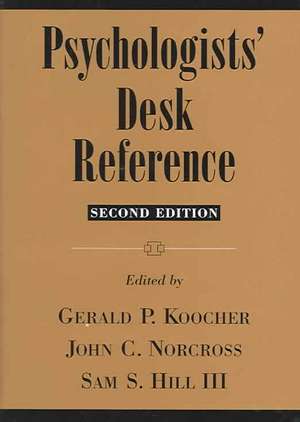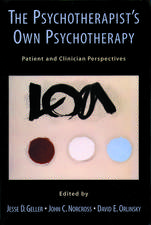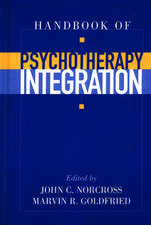Psychologists' Desk Reference
Editat de Gerald P. Koocher, John C. Norcross, Sam W. Wieselen Limba Engleză Hardback – 31 oct 2004
Preț: 444.76 lei
Preț vechi: 468.16 lei
-5% Nou
Puncte Express: 667
Preț estimativ în valută:
85.11€ • 92.42$ • 71.50£
85.11€ • 92.42$ • 71.50£
Carte tipărită la comandă
Livrare economică 18-30 aprilie
Preluare comenzi: 021 569.72.76
Specificații
ISBN-13: 9780195166064
ISBN-10: 019516606X
Pagini: 735
Dimensiuni: 185 x 257 x 57 mm
Greutate: 1.51 kg
Ediția:Second.
Editura: OXFORD UNIV PR
Locul publicării:New York, United States
ISBN-10: 019516606X
Pagini: 735
Dimensiuni: 185 x 257 x 57 mm
Greutate: 1.51 kg
Ediția:Second.
Editura: OXFORD UNIV PR
Locul publicării:New York, United States
Descriere
Here is the revised and expanded edition of the indispensable companion for every mental health practitioner. Improved over the first edition by input and feedback from clinicians and program directors, the Psychologists' Desk Reference, Second Edition presents an even larger variety of information required in daily practice in one easy-to-use resource. Covering the entire spectrum of practice issues--from diagnostic codes, practice guidelines, treatment principles, and report checklists, to insight and advice from today's most respected clinicians--this peerless reference gives fingertip access to the entire range of current knowledge. Intended for use by all mental health professionals, the Desk Reference covers assessment and diagnosis, testing and psychometrics, treatment and psychotherapy, ethical and legal issues, practice management and insurance, and professional resources. Chapters have been clearly written by master clinicians and include easy-to-read checklistsand tables as well as helpful advice. Filled with information psychologists use everyday, the Psychologists' Desk Reference, Second Edition will be the most important and widely used volume in the library of psychologists, social workers, and counselors everywhere.This new edition features: -Thoroughly revised chapters by the field's leaders.-29 entirely new chapters, now totaling 140.-Sections reorganized to be smaller and more specific, making topics easier to find.-A listing of valuable Internet sites in each chapter.-Increased emphasis on evidence-based practices.A companion website containing graphics, illustrations, tables, primary resources, extensive bibliographies, links to related sites, and much more.
Cuprins
ContributorsPart I--Assessment and Diagnosis1. Lifetime Prevalence of Mental Disorders in the General Population, Christie P. Karpiak and John C. Norcross2. Mental Status Examination, Robert W. Baker and Paula T. Trzepacz3. Improving Diagnostic and Clinical Interviewing, Rhonda S. Karg & Arthur N. Wiens4. The Multimodal Life History Inventory, Arnold A. Lazarus and Clifford N. Lazarus5. Increasing the Accuracy of Clinical Judgment (and Thereby Treatment Effectiveness) David Faust6. Developmental Neuropsychological Assessment, Jane Holmes Bernstein, Betsy Kammerer, Penny Prather, & Celiane Rey-Casserly7. Adult Neuropsychological Assessment, Aaron P. Nelson and Margaret O'Connor8. Assessment and Intervention for Executive Dysfunction, Robert M. Roth, Peter K. Isquith and Gerard A. Gioia9. Child and Adolescent Diagnosis with DSM-IV, Stuart M. Goldman10. Clinical Assessment of Ethnic Minority Children Using DSM-IV, Ronn Johnson11. Medical Evaluation of Children with Behavioral or Developmental Disorders, James L. Lukefahr12. Interviewing Parents, Carolyn S. Schroeder and Betty N. Gordon13. Attention-Deficit/Hyperactivity Disorder Through the Life Span, Robert J. Resnick14. Assessment of Suicidal Risk, Kenneth S. Pope and Melba J.T. Vasquez15. Assessment of Malingering on Psychological Measures, Richard Rogers16. Identification and Assessment of Alcohol Abuse, Linda Carter Sobell and Mark B. Sobell17. Measures of Acculturation, Juan Carlos Gonzalez18. DSM-IV-TR Classification Systems, American Psychiatric Association19. A Practical Guide to the Use of the Global Assessment of Functioning (GAF) Scale of the DSM-IV-TR, American Psychiatric Association20. Assessment of Character Strengths, Christopher Peterson, Nansook Park, and Martin E.P. SeligmanPart II--Psychological Testing21. Fifty Widely Used Psychological Tests, Thomas P. Hogan22. Sources of Information About Psychological Tests, Thomas P. Hogan23. Publishers of Psychological and Psychoeducational Texts, Thomas P. Hogan24. Types of Test Scores and Their Percentile Equivalents, Thomas P. Hogan25. Assessing the Quality of a Psychological Testing Report, Gerald P. Koocher26. Child Behavior Observations, Janice Ware27. Measures of Children's Psychological Development, Sam S. Hill28. Assessing MMPI-2 Profile Validity, James N. Butcher29. Clinical Sales of the MMPI-2, John R. Graham30. Supplementary Scales of the MMPI-2, Roger L. Greene31. Characteristics of High and Low Scores on the MMPI-2 Clinical Scales, John R. Graham32. Empirical Interpretation of the MMPI-2 Codetypes, James N. Butcher33. Millon Clinical Multiaxial Inventory (MCMI--III), Theodore Millon and Seth D. Grossman34. Millon Adolescent Clinical Inventory (MACI), Theodore Millon and Seth D. Grossman35. Thumbnail Guide to the Rorschach Method, Barry A. Ritzler36. Rorschach Assessment: Questions and Reservations, Howard N. Garb, James M. Wood, and Scott O. Lilienfield37. Rorschach Assessment: Scientific Status and Clinical Utility, Irving B. WeinerPart III--Individual Psychotherapy and Treatment38. Patients' Rights in Psychotherapy, Dorothy W. Cantor39. Compendium of Empirically Supported Treatments, Dianne L. Chambless40. Compendium of Psychotherapy Treatment Manuals, Michael J. Lambert, Taige Bybee, Ryan Houston, Matthew Bishop, A. Danielle Sanders, Ron Wilkinson, and Sara Rice41. Compendium of Empirically Supported Relationships, John C. Norcross and Clara E. Hill42. Enhancing Adherence, M. Robin DiMatteo43. Methods to Reduce and Counter Resistance in Psychotherapy, Albert Ellis44. Repairing Ruptures in the Therapeutic Matching, Jeremy D. Safran45. Systematic Assessment and Treatment Matching, Oliver B. Williams, Larry E. Beutler, and Kathryn Yanick46. Stages of Change: Perspective Guidelines, James O. Prochaska, John C. Norcross, and Carlo C. DiClemente47. Psychotherapy Treatment Plan Writing, Arthur E. Jongsma, Jr.48. Key Principles in the Assessment of Psychotherapy Outcome, Michael J. Lambert, Bruce W. Jasper, and Joanne White49. Treatment and Management of the Suicidal Patient, Bruce Bongar and Glenn R. Sullivan50. Crisis Intervention, Kenneth France51. Impact of Disasters, Eric M. Vernberg and R. Enrique Varela52. Principles in the Treatment of Borderline Personality Disorder, John F. Clarkin and Pamela A. Foelsch53. Psychotherapy with Reluctant and Involuntary Clients, Stanley L. Brodsky54. Treatment Matching in Substance Abuse, Carlo DiClemente55. Motivational Interviewing, William R. Miller and Theresa B. Moyers56. Anxiety/Anger Management Training, Richard M. Suinn57. Psychological Interventions in Adult Disease Management, Carol D. Goodheart58. Assessing and Treating Normative Male Alexithymia, Ronald F. Levant59. Assessing and Treating Male Sexual Dysfunction, Joseph LoPiccolo and Lynn M. Van Male60. Assessing and Treating Female Sexual Dysfunction, Joseph LoPiccolo and Lynn M. Van Male61. Assessing and Reducing Risk of Infection with the Human Immunodeficiency Virus, Michael P. Carey62. Guidelines for Treating Women in Psychotherapy, Laura S. Brown and Felicia A. Mueller63. Assessment and Treatment of Lesbians, Gay Men, and Bisexuals, Robin A. Burke and Douglas C. Haldeman64. Psychotherapy with Older Adults, Margaret Gatz and Bob G. Knight65. Refusal Skills Training, Robert H. Woody and Jennifer K.H. Woodyr66. Sexual Feelings, Actions, and Dilemmas in Psychotherapy, Kenneth S. Pope67. Six Steps to Improve Psychotherapy Homework Compliance, Michael A. Tompkins68. Stimulus Control Instructions for the Treatment of Insomnia, Richard R. Bootzin69. Parent Management Training for Childhood Behavior Disorders, Laura J. Schoenfeld and Sheila Eyberg70. Using Hypnosis to Invite Relaxation, Douglas Flemons71. Working with the Religiously Committed Client, P. Scott Richards and Kari O'Grady72. Psychotherapy with Cognitively Impaired Adults, Kathleen B. Korte, Felicia Hill-Briggs, and Stephen T. Wegener73. Early Termination and Referral of Clients in Psychotherapy, Manferd D. Koch74. Guidelines for Relapse Prevention, Katie Witkiewitz and G. Alan Marlatt75. Guidelines for Terminating Psychotherapy, Oren M. Shefet and Rebecca CurtisPart IV--Couples, Family, and Group Treatment76. Choice of Treatment Format, John F. Clarkin77. Genograms in Assessment and Therapy, Sueli S. Petry and Monica McGoldrick78. Guidelines for Conducting Couple and Family Therapy, Jay L. Lebow79. Treating High-Conflict Couples, Susan Heitler80. Treatment of Marital Infidelity, Don-David Lusterman81. Group Psychotherapy: An Interpersonal Approach, Victor J. Yalom82. Psychoeducational Group Treatment, Gary M. Burlingame and Nathanael W. RidgePart V--Child and Adolescent Treatment83. Principles of Treatment with the Behaviorally Disordered Child, Esther Calzada, Awra Aamiry, and Sheila M. Eyberg84. Psychological Interventions in Childhood Chronic Illness, Robert J. Thompson, Jr. and Kathryn E. Gustafson85. Methods to Engage the Reluctant Adolescent, Alice K. Rubenstein86. The APSAC Study Guides, Jeannie Baker and Sam S. Hill87. Interviewing Children When Sexual Abuse is Suspected, Karen L. Saywitz and Joyce S. Dorado88. Treatment of Child Sexual Abuse, Kathryn KuehnlePart VI--Biology and Pharmacotherapy89. Normal Medical Laboratory Values and Measurement Conversions, Gerald P. Koocher and Samuel Z. Goldhaber90. Use of Height and Weight Assessment Tools, Nancie H. Herbold and Sara Edelstein91. Physical Disorders that May Present as Psychological Disorders, William J. Reed92. Adult Psychopharmacology 1: Common Usage, Joseph K. Belanoff, Charles DeBattista, and Alan F. Schatzberg93. Adult Psychopharmacology 2: Side Effects and Warnings, Elaine Orabona Mantell94. Pediatric Psychopharmacology, Timothy E. Wilens, Thomas J. Spencer, and Joseph Biederman95. Dietary Supplements and Psychological Functioning, Sari Edelstein and Nancie Herbold96. Common Drugs of Abuse, Christopher J. Correia and James G. MurphyPart VII--Self-Help Resources97. Top Internet Sites for Psychologists and Their Clients, John M. Grohol98. Highly Rated Self-Help Books and Autobiographies, John C. Norcross and Jennifer A. Simansky99. Popular Films Portraying Mental Disorders, Danny Wedding100. Facilitating Client Involvement in Self-Help Groups, Elena Klaw and Keith Humphreys101. National Self-Help Groups and Organizations, Dennis C. Reidy and John C. Norcross102. Known and Unproven Herbal Treatments for Psychological Disorders, Paula J. BiedenharnPart VIII--Ethical and Legal Issues103. American Psychological Association's Ethical Principles of Psychologists and Code of Conduct, American Psychological Association104. Privacy, Confidentiality, and Privilege, Gerald P. Koocher105. Involuntary Psychiatric Hospitalization (Civil Commitment): Adult and Child, Stuart A. Anfang and Paul S. Applebaum106. Physical Restraint and Seclusion: Regulations and Standards, Thomas P. Graf107. Basic Principles for Dealing with Legal Liability Risk Situations, Gerald P. Koocher108. Defending Against Legal Complaints, Robert H. Woody109. Dealing with Licensing Board and Ethics Complaints, Gerald P. Koocher and Patricia Keith-Speigel110. Dealing with Subpoenas, Gerald P. Koocher111. Glossary of Legal Terms of Special Interest in Mental Health Practice, Gerald P. Koocher112. Fifteen Hints on Money Matters and Related Ethical Issues, Gerald P. Koocher and Sam S. Hill113. How to Confront an Unethical Colleague, Patricia Keith-Speigel114. Confidentiality and the Duty to Protect, Tiffany Chenneville115. Forensic Evaluations and Testimony, Stanley L. Brodsky116. Forensic Evaluation Outline, David L. Shapiro117. Forensic Referrals Checklist, Geoffrey R. McKee118. Expert Testimony in Depositions, Geoffrey R. McKee119. Forensic Assessment Instruments, Randy Borum120. Evaluation of Competency to Stand Trial, Paul D. Lipsit121. A Model for Clinical Decision Making with Dangerous Patients, Leon VandeCreek122. Principles for Conducting a Comprehensive Child Custody Evaluation, Barry Bricklin123. Recognizing, Assisting, and Reporting the Impaired Psychologist, Gary R. Schoener124. Essential Features of Professional Liability Insurance, Bruce E. BennettPart X--Practice Management125. Sample Psychotherapist--Patient Contract, Eric A. Harris and Bruce E. Bennett126. Fundamentals of the HIPAA Privacy Rule, Jason M. Bennett127. Basic Elements of Consent, Gerald P. Koocher128. Basic Elements of Release Forms, Gerald P. Koocher129. Prototype Mental Health Records, Gerald P. Koocher130. Utilization Review Checklist, Gerald P. Koocher131. Contracting with Managed Care Organizations, Stuart L. Koman and Eric A. Harris132. Billing Issues, Gerald P. Koocher133. Psychotherapists' Fees and Incomes, John C. Norcross134. Establishing a Consultation Agreement, Len Sperry135. Computerized Billing and Office Management Programs, Edward L. ZuckermanPart XI--Professional Resources136. Therapist Self-Care Checklist, John C. Norcross and James D. Guy, Jr.137. Conducting Effective Clinical Supervision, Nicholas Ladany138. Guide to Interacting with the Media, Lilli Friedland and Florence Kaslow139. Common Clinical Abbreviations and Symbols, John C. Norcross140. Major Professional Associations, John C. NorcrossIndexWhat Do You Want in the Next Edition?
Recenzii
"This reference gives fingertip access to the entire range of current knowledge. Chapters have been written by master clinicians and include easy-to-read checklists and valuable Internet sites, as well as practical advice."--ADOLESCENCE |k No
Notă biografică
Gerald P. Koocher, PhD, is Professor and Dean of the School for Health Studies at Simmons College (Boston). From 1971 through 2001 he served successively as an intern, post-doctoral fellow, and ultimately as Chief of Psychology at Boston's Children't Hospital and Judge Baker Children's Center. During this period he also served as a full time faculty member (Associate Professor) at Harvard Medical School. Dr. Koocher is a fellow of twelve divisions of the American Psychological Association (APA) and a Fellow of the American Association for the Advancement of Science. He is the only psychologist to have earned five specialty diplomas from the American Boards of Professional Psychology (Clinical, Clinical Child/Adolescent, Family, Forensic, and Health Psychology). He is currently Editor of the journal Ethics and Behavior and previously served as Editor of the Journal ofPediatric Psychology and The Clinical Psychologist. He has published more than 150 articles and book chapters and authored or edited eight books.







